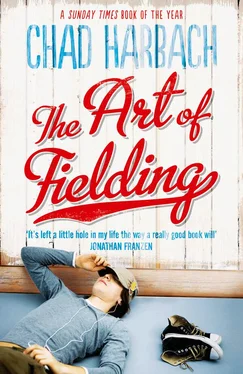Pella frowned at her wicker bag. “Actually, this is all I brought.”
“Oh.” Affenlight had been hoping she might stay for a while; the ticket, after all, had been one-way. But a lack of luggage didn’t bode well. He didn’t dare ask; better to enjoy the present. Perhaps if the question of leaving never came up, she’d forget to want to leave. “Well then. Should we hit the road?”
I-43, after passing through the northern Milwaukee suburbs, cut due north through vast stretches of flat, yet-unplanted fields. Clouds obscured the moon and stars, and the southbound traffic was sparse. Off to the right lay Lake Michigan, invisibly guiding the highway’s course. Pella expected an immediate grilling—How long are you staying? Have you broken up with David? Are you going back to school?—but her father seemed anxious and preoccupied. She wasn’t sure whether to feel relieved or insulted. They spent most of the ride in silence, and when they spoke, they spoke in monosyllables, more like characters in a Carver story than real live Affenlights.
The president’s quarters, cozily appointed in academia’s dark wood and leather, were located on the uppermost floor of Scull Hall, in the southeast corner of the Small Quad. The Westish presidents of the twentieth century had all lived downtown, in one or another of the elegant white houses that flanked the lake, but Affenlight, the first president of the twenty-first, had decided to revive the quarters’ original purpose and reside among the students. It was just him, after all. This way his office lay just a staircase away from his apartment, and he could sneak down at dawn for a quiet stint of work, dressed in whatever, before Mrs. McCallister arrived and the day’s appointments began.
He poured them each a whiskey, his with water, Pella’s without. “I suppose this is legal now,” he said as he handed her the glass.
“Takes half the fun out of it.” Pella arranged herself in a square leather chair, drew her knees up to her chest. “So how’s business?”
Affenlight shrugged. “Business is business,” he said. “I don’t know why they keep hiring English professors for these jobs. They should get guys from Goldman Sachs or something. If I have ten minutes a day to think about something besides money, I consider myself lucky.”
“How’s your health?”
He drummed on his sternum. “Like a bull,” he said.
“You’re taking your medicine?”
“I take my walk by the lake every day,” Affenlight said. “That’s better than medicine.”
Pella gave him a distressed maternal look.
“I take them,” he said. “I take them and take them. Though you know how I feel about pills.”
“Take them,” Pella said. “Are you seeing anyone?”
“Oh. Well . . .” Seeing, actually, was just the word for it. “Let’s just say there aren’t many enthralling women in this part of the world.”
“If there are any, I’m sure you’ll hunt them down.”
“Thanks,” Affenlight said dryly. “And you? How’s David?”
“David’s fine. Although he’ll be less so when he finds out I’m gone.”
“He doesn’t know you’re here?” This revelation trumped the lack of luggage; Affenlight resisted the urge to stand and pump his fist.
“He’s in Seattle. On business.”
“I see.”
Lately it seemed to Affenlight that the students were growing younger; maybe he was just getting old, or maybe adolescence was stretching out longer and longer, in proportion with the growing life span. Colleges had become high schools; grad schools, colleges. But Pella, as always, seemed intent on shooting ahead of her peers. She looked older than he remembered, of course — her cheeks less round, her features more pronounced — but she also looked older than twenty-three. She looked like she’d been through a lot.
“Are you tired?” he asked, remembering not to say You look tired.
She shrugged. “I haven’t been sleeping much.”
“Well, the bed in the guest room is great.” Mistake: he should have said your room. Or would that have seemed too eager? Anyway, onward: “And the darkness out here is something to behold. Totally different from Boston. Or San Francisco.”
“Great.”
“You can stay as long as you like. Of course.”
“Thanks.” Pella finished her whiskey, peered into the bottom of her glass. “Can I ask one more favor?”
“Shoot.”
“I’d like to start taking classes.”
“You would?” Affenlight stroked his chin and considered this happy news. “That should work out fine,” he said, trying to keep his tone as neutral as possible; to betray too much enthusiasm might backfire. “The deadlines for the fall have passed, of course, but you can register for the summer session as a visitor, and if we sign you up for the next SAT date, I’m sure I could convince Admissions —”
“No no,” Pella said quietly. “Right away.”
“What’s that?”
“I . . . I was hoping I could start right away.”
“But, Pella, the summer is right away. It’s already April.”
Pella chuckled nervously. “I was thinking about tomorrow.”
“Tomorrow?” Every nerve in Affenlight’s spine quivered, half with love of his daughter, half with indignation at her presumption. “But, Pella, we’re halfway through the semester. Surely you can’t expect to hop right in.”
“I could catch up.”
Affenlight set down his drink, drummed his fingers on the arm of the chair. “I don’t doubt that you could. You’re an excellent student when you choose to be. But it’s not simply a matter of catching up. It’s a matter of courtesy. As a professor, I can tell you I wouldn’t be pleased to be suddenly told —”
“Please,” Pella said. “I could just audit. I know it’s not ideal.”
Those first two years after Pella’s mother died: call them an adjustment period. He tried day care — expensive day care — but as soon as Affenlight grew accustomed to the fact that Pella was his, the sons and daughters of his fellow professors seemed like wan, elitist company. Better to throw her in with hoi polloi, to let her lift them up — but no, that would be even worse. He’d wanted to take her to another country, Italy, or Uganda, or somewhere, where it might be possible to raise her properly; he wanted to buy a tract of land in Idaho or Australia, with hills and streams and trees and rocks and birds and mammals, where Pella could roam and explore and he could trail behind, watching her grow; alternately he wanted to drop her at an orphanage and get back his life.
But something happened, to her and to him, when Pella learned to read. He would struggle out of bed after a late night’s work to find her already awake and dressed, in the breakfast nook of their townhouse on Shepard Street, reading from some or another novel — Judy Blume, Trixie Belden, her abridged Moby-Dick — or else some picture-laden science book culled from the stacks of Widener. She read with colored pencil in hand, copying the best sentences and sketching members of her favorite phyla onto sheets of construction paper. A few last Cheerios, floating in a bowl beside her elbow, impressed Affenlight as symbols of utter independence.
When interrupted by a polite paternal throat-clearing, Pella would look up from her book and wipe a coppery curl from her eyes, her expression oddly reminiscent of the one Affenlight’s dissertation adviser would assume when Affenlight appeared unannounced at his office door, and that Affenlight always thought of as studius interruptus. Still groggy and somewhat cowed by his daughter’s industry, he would tousle her hair, start the coffee, and head back to bed. If the school authorities wanted her that badly, he reasoned, they could come a-knocking.
Читать дальше










